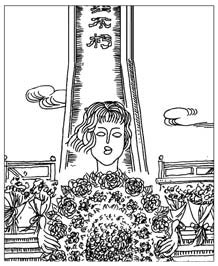A time to reflect, pay our respects
By Li Xing (China Daily)
Updated: 2008-03-27 07:22
Updated: 2008-03-27 07:22

The first Tomb Sweeping Day as a national holiday arrives in a week's time.
Tourism bureaus and other businesses are devising ways to cash in on the coming long weekend.
Meanwhile, local civil affairs administrations are closely working with traffic police and fire departments as well as industrial and commercial bureaus to come up with all kinds of contingency plans.
After all, they shoulder the responsibilities to make it convenient and safe for large crowds of people going to cemeteries to pay their respects to ancestors and loved ones. It is reported that about 7 million residents in Shanghai alone will make the trip to cemeteries in suburban areas and neighboring provinces.
Folklorists, meanwhile, remind us of the good old traditional values of Tomb Sweeping Day. Their work is worthwhile as it is important for all people to have a better understanding of the tradition.
However, I do agree with some critics that we should not observe the tradition by merely conducting the ritual of burning paper money and other items.
Yes, the ancient Chinese belief that there is life after death still lingers. In the ancient days, the belief made the dynastic emperors arrange for their proper burials long before their deaths so that they would be able to live the same luxurious and commanding life after they died. The huge army of terracotta warriors and chariots of the First Qin Emperor gives splendid testimony to this.
For the poor, they turned to burning paper money and paper-made replicas of all items that might enable their dear ones to live a better life in after world.
Today, this ritual seems to be running a little rampant. Over the years, we have heard of persistent smoke and fires in cemeteries or even in adjacent residential areas, as replicas of houses, cars and mahjong tiles are burned.

As a national holiday, Tomb Sweeping Day should also be treated as a solemn occasion to remember all those who have sacrificed their lives for the betterment of the society.
Indeed, during my childhood, all the deaths that I read or heard, or saw on movie screens, were associated with revolutions, heroism and courage. Tomb Sweeping Day, to most of us, was the day we made our vows to follow in the steps of the revolutionaries and heroic people, who helped found New China and enabled all us multi-ethnic Chinese to live a life free from imperialist invasion and feudal oppression.
All the ceremonies that I went to on Tomb Sweeping Day when I was a child have in some way helped enhance in me a strong sense of justice and morality.
Of course, that same sense in many of us Chinese has evolved over the years, but it has guided us in our work and life.
An American friend of mine told me that he had felt that some of his Chinese friends' sense of morality was stronger than most Americans he knew, even though these Chinese do not necessarily believe in God.
I think Gu Jun, a professor with Shanghai University, is right in stating that designating Tomb Sweeping Day as a national holiday is not a simple return to the tradition or a mere salvation of traditional culture.
It is a day for us to think about the past, how to carry out the wills of our ancestors and our respected ones, to make our society and our life even better.
E-mail: lixing@chinadaily.com.cn
(China Daily 03/27/2008 page8)
|
|
|
|